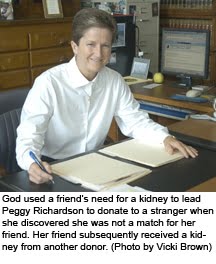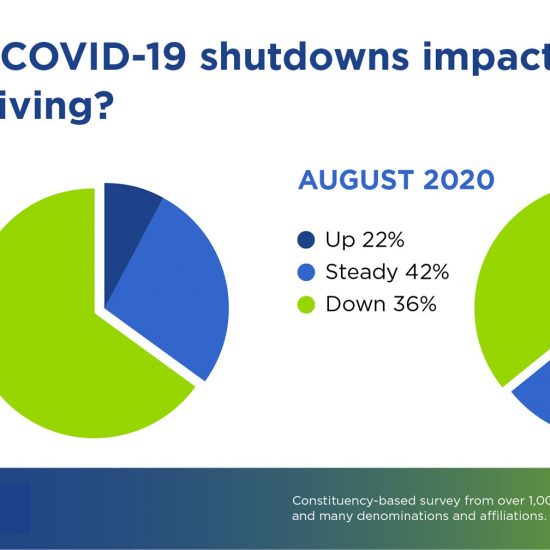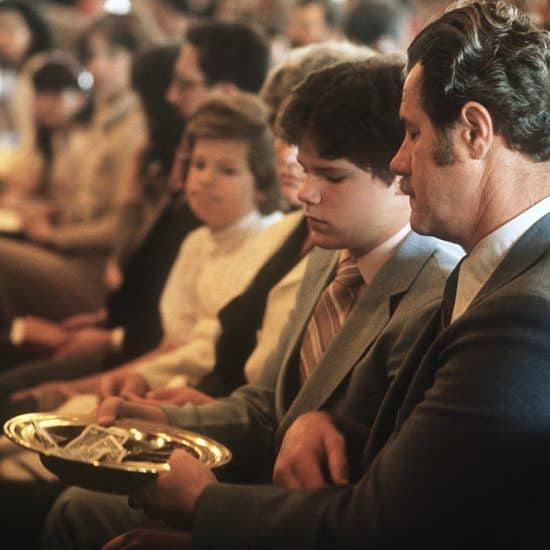By Vicki Brown, Word&Way Associate Editor
"We are all here to help one another in some form. For some people, it is to be a missionary. For some people, that is to be a soldier," Peggy Richardson said.
 God asked the associate Circuit Court judge for Moniteau County to help by donating a kidney to someone she didn't even know.
God asked the associate Circuit Court judge for Moniteau County to help by donating a kidney to someone she didn't even know.
Richardson confessed she had little idea of the process individuals who need transplants face until a friend needed a kidney.
While visiting him in Florida in the summer of 2004, Richardson discovered that her longtime friend, David, had not been feeling well. His doctor determined that David suffered from a genetic kidney disorder, apparently passed down from his mother but that he didn't know he had.
By the time it was discovered, David's disease had progressed to the point of needing dialysis or a transplant. Wanting to help him, the judge offered to donate a kidney, but blood type kept her from being a donor match.
"When I found out with David that we were not a match, I felt 'well, I tried,'" she said.
But she could not shake the feeling that perhaps God wanted her to give a kidney anyway — to someone else.
"It stayed on my heart and on my mind. I think that was God's direction. He seemed to say, 'I have a blessing I want you to share in,'" she added.
As David struggled to keep working while juggling his health issues, the judge discovered "being confined to dialysis takes up a lot of your life," she said. "Your whole life revolves around that."
God used her friend's situation and Richardson's preparation for donating to David to heighten her awareness of the plight of others.
"I did all that research and just found out so much about the need, just how much you [a person who needs a kidney] are at the mercy of the general public," she explained.
She decided to make that awareness personal. "I thought about how I would feel if I were one of those 60,000 people [the number of individuals awaiting kidney transplants]," she said. "A transplant really is a second chance at life."
Her discoveries led her to consider the possibility of donating to someone else.
In August 2004, Richardson decided to call Barnes-Jewish Hospital in St. Louis. The hospital referred her to Mid-America Transplant Services and its Second Chance Saint Louis program for donors who do not have a specific recipient in mind.
Tests discovered match
She was put through several blood and psychological tests, and in May 2005 learned she was a match for a waiting kidney patient. She underwent surgery that July.
But she hesitated to share her story. She intentionally asked to remain an anonymous donor because she didn't want the recipient to feel that he or she "owed" her something in return.
And she doesn't want those who hear or read her story to consider her a hero. "I'm not a hero. Missionaries and soldiers — in my book, those are the heroes," she said.
"I felt like…I have been so blessed in my life. I think blessings are something we can share. I have been blessed with good health, and that was a blessing I could share with someone.
"I don't mean to imply that everyone should do what I did," the member of First Baptist Church, Tipton, quickly added. "Not everyone is called to minister in the same way…. But if you are called, you need to be obedient to that call."
Richardson encourages individuals interested in pursuing the living donor program to talk to their doctor, to bathe the possibility in prayer and to research the disease and the need for donors.
A matter of calling
She believes that others will be blessed, just as God fulfilled His promise to her, for their obedience. "[Donating a kidney] was a blessing, I think, because this was something I felt called to do. It was not something I took lightly, but I answered the call….
"I feel good about being obedient to something that wasn't easy…and I feel good about being able to help out a fellow human being."
And she emphasized that God empowers believers to do what He calls them to do. "I know I did the right thing and there's a blessing in that knowledge…. I never had any misgiving or doubts about it turning out well."
Richardson also reminds people who hear her story that giving living tissue, even to a stranger, isn't that unusual.
"We donate blood to people we don't know. We sign on our drivers license to give organs when we die," she said. "Being a living donor is just another form of sharing."
(07-13-06)



